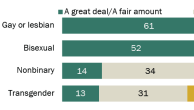
The Experiences of LGBTQ Americans Today
How lesbian, gay, bisexual, transgender and queer adults view Obergefell’s impact on social acceptance for LGBTQ people, 10 years after the Supreme Court decision legalizing same-sex marriage.
Numbers, Facts and Trends Shaping Your World
Senior Associate Director, Research
Expertise:Demographics and Social Trends
Juliana Menasce Horowitz is a senior associate director of research at Pew Research Center. She is involved in all stages of the research process, including designing and managing major survey projects, developing questionnaires, analyzing polling data, writing reports and presenting survey results. She has conducted research and written on various social issues, including racial attitudes, cross-national views of gender equality, and the changing American family, and also has worked actively on the Center’s U.S. politics and global attitudes research efforts. Before joining Pew Research Center in 2006, Horowitz worked at the Center for American Politics and Citizenship at the University of Maryland. She received a doctorate in political science from the University of Maryland at College Park. Horowitz regularly presents findings from the Center’s studies to the policy and academic communities and has been interviewed by numerous domestic and international media outlets.
How lesbian, gay, bisexual, transgender and queer adults view Obergefell’s impact on social acceptance for LGBTQ people, 10 years after the Supreme Court decision legalizing same-sex marriage.
Americans have expressed skepticism that attention to racial issues after Floyd’s killing led to changes that improved Black people’s lives.
Similar shares of adults say there’s too little emphasis on encouraging boys and girls to be leaders.
Fewer than four-in-ten teens (36%) say they know someone who’s transgender, and 28% know someone who’s nonbinary.
U.S. workers feel their jobs are secure and few are seeking a job change. But only half are highly satisfied with their job overall.
Republican men stand out in views of their own masculinity, the impact of changing gender roles and men’s progress in recent decades.
Some 57% of adults under 50 who say they are unlikely to have kids say a major reason is they just don’t want to. Among those ages 50 and older, 31% cite this as a reason.
Public K-12 teachers express low job satisfaction and few are optimistic about the future of U.S. education.
We asked public K-12 teachers, teens and U.S. adults how they see topics related to race and LGBTQ issues playing out in the classroom.
Most U.S. young adults are at least mostly financially independent and happy with their parents’ involvement in their lives. Parent-child relationships are mostly strong.
Notifications